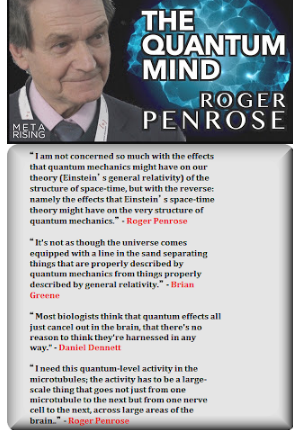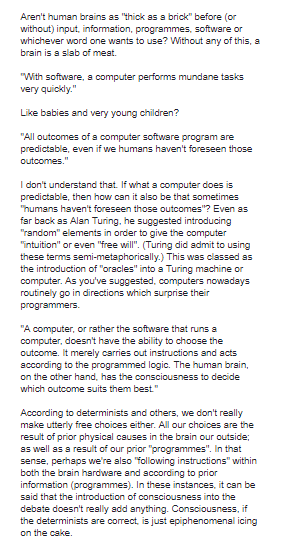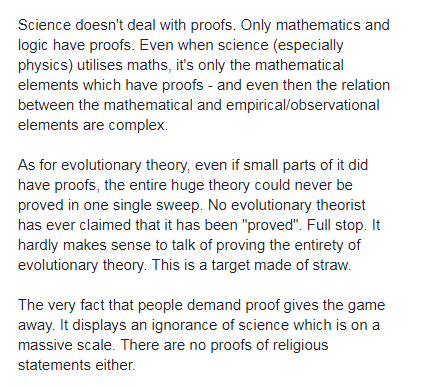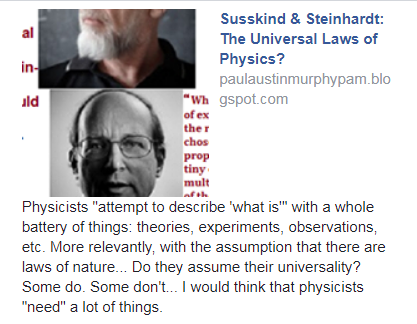i) Introduction
ii) The Quantum Scale and the Large Scale
iii) The Brain and Quantum Gravity
iv) Daniel Dennett's Quantum Car
v) Microtubules
Throughout Roger Penrose's writings on the brain, consciousness, physics and cosmology, the issue of the link between the quantum scale and the large (“classical”) scale is constantly broached. Indeed all this strongly links in with Penrose's attempt to tie general relativity/gravity and quantum mechanics together.
Penrose's own individualistic position on the relation between the quantum scale
and the large scale is expressed in
the
following:
“I
am not concerned so much with the effects that quantum mechanics
might have on our theory (Einstein’s general relativity) of the
structure of space-time, but with the reverse: namely the effects
that Einstein’s space-time theory might have on the very structure
of quantum mechanics.”
This
is (as Penrose himself puts it) “an unconventional
view-point” - or it was in 1990!. It's
“unconventional
that general relativity should have any influence at all on the
structure of quantum mechanics!”.
More
basically, Penrose believes that “the problems within quantum
theory itself are of a fundamental character”.
In
terms of the brain and mind, Penrose concluded – again, 28 years ago - by
saying that
“any
putative quantum gravity theory would surely be very remote from the
phenomena governing the behaviour of brains”.
Nonetheless,
the following is the crux
of Penrose's current
position:
i)
Quantum gravity (or the “structure of space-time”) may have an
impact on quantum mechanics.
ii)
Therefore quantum gravity may affect the nature of the brain and
mind.
At
the most basic level, gravitation and general relativity aren't
integrated into quantum theory. That alone makes Penrose's views on the brain, mind and consciousness speculative.
In terms of the brain and mind/consciousness, most neuroscientists and many philosophers believe that
quantum phenomena (or quantum events/effects/conditions/etc.) have very little affect on the brain and therefore on the mind/consciousness as a whole. Or, at the
very least, that the differences they do make don't really make a
difference.
The
Quantum Scale & the Large Scale
As
stated above, Penrose notes the micro-macro situation in ways which
don't directly relate to the brain and mind. In the
following, for example, he notes the contextual (i.e., micro or
macro) nature of the notion of randomness (or probabilities). That
is, Penrose notes how randomness is a consequence of scientists observing quantum
effects/events/conditions/etc. at the “classical level”. In
Penrose's own
words:
“Since
randomness comes in, quantum theory is called probabilistic. But
randomness only comes in when you go from the quantum to the
classical level. If you stay down at the quantum level, there's no
randomness. It's only when you magnify something up, and you do what
people call 'make a measurement'. This consists of taking a
small-scale quantum effect and magnifying it out to a level where you
can see it. It's only in that process of magnification that
probabilities come in.”
This
can be deemed to be an epistemic problem, rather than an ontological
one. That is, the probabilities (or randomness) arises not from the
ontology of the quantum world, but from our epistemic access to it.
(This conclusion, at least as it partly applies to quantum
indeterminism, dates back to Albert Einstein and was
elaborated upon by such people as David
Bohm.)
The
other point that's worth making about Penrose's position (as quoted
above) is that it goes against the stress on quantum indeterminism as
it's often used in reference to the brain and mind/consciousness. In other
words, Penrose (at least in this context) is de-stressing the random
(or indeterministic) nature of the quantum realm; whereas many others
(at least in the debate about mind) play it up. (“Quantum
indeterminism” is particularly stressed as one explanation of free
will.) Of course it must be said here that the words “random” and
“indeterminate” (or “randomness” and “indeterminacy”)
aren't exactly synonyms. Nonetheless, in the debate about the
“quantum mind” (as it's often put), these words are indeed often
treated as synonyms (or, at the very least, as near-synonyms).
If
we now return to the quantum scale and the large scale.
On
a much broader level we can also take Brian Greene's (a Professor
of Physics and
Mathematics at Columbia University)
general point
about this micro-macro distinction:
“It's
not as though the universe comes equipped with a line in the sand
separating things that are properly described by quantum mechanics
from things properly described by general relativity. Dividing the
universe into two separate realms seems both artificial and clumsy.”
This
position seems to back up Penrose's previous points about how
different levels of description (which are brought about by the
effect of “measurement”/observation) determine Greene's
“line in the sand” between the quantum realm and the “classical”
realm.
And,
yet again, Penrose notes these different levels when he talks about
Newtonian mechanics, relativity and quantum theory. He stresses the
compatibility of these different levels of description/application
and their respective “limits”. He
says:
“Current
physics ideas will survive as limiting behavior, in the same sense
that Newtonian mechanics survives relativity. Relativity modifies
Newtonian mechanics, but it doesn't really supplant it. Newtonian
mechanics is still there as a limit. In the same sense, quantum
theory, as we now use it, and classical physics, which includes
Einstein's general theory, are limits of some theory we don't yet
have.”
In
the above we can see that rather than measurement (or observation)
splitting the universe into two realms, Penrose stresses the respective “limits” of these realms instead.
The
Brain & Quantum Gravity
Roger
Penrose was - and still is - deeply aware of the arguments against
his central position on the brain and mind/consciousness. Indeed when he
wrote The
Emperor's New Mind (in
1990)
he
didn't have an original position on the quantum nature of the brain.
Specifically, microtubules aren't mentioned in this well-known book.
And even neurons and neurotransmitters only get four mentions.
This
is what Penrose
also had to say
(in the same book) on the opposition's position on the brain, quantum
mechanics and consciousness:
“...
they would argue that on a scale relevant to our brains the physical
effects of any quantum gravity must be totally insignificant! They
would say (very reasonably) that although such physical effects might
indeed be important at the absurdly tiny distance scale known as the
Planck length — which
is 10 35 m, some
100000000000000000000 times smaller than the size of the tiniest
subatomic particle — these effects should have no direct relevance
whatever to phenomena at the far far larger ‘ordinary’ scales of,
say, down only to 10 12 m, where the chemical or electrical processes
that are important to brain activity hold sway.”
In fact Penrose went further by saying that his detractors would claim that
not even ordinary gravity (as it were) can affect the brain. He wrote:
“Indeed,
even classical (i.e. non-quantum) gravity has almost no influence on
these electrical and chemical activities.”
Penrose
concluded with
the following sceptical words.
(At least as he then believed that they'd be expressed by his
opponents.) He wrote:
“If
classical gravity is of no consequence, then how on earth could any
tiny ‘quantum correction’ to the classical theory make any
difference at all? Moreover, since deviations from quantum theory
have never been observed, it would seem to be even more unreasonable
to imagine that any tiny putative deviation from standard quantum
theory could have any conceivable role to play in mental phenomena!”
Thus,
at this period in Penrose's career (in the early 1990s), his position squared perfectly
well with Murray Gell-Mann's later position when Gell-Mann
wrote:
“...
what characterises [Roger Penrose's] proposal... is the notion that
consciousness is somehow connected with quantum gravity – that is
to say, the incorporation of Einsteinian general-relativistic
gravitation into quantum field theory. I can see absolutely no
reason for imagining such a thing.”
And
all this brings us to Dennett's quantum car.
Daniel
Dennett's Quantum Car
Daniel
Dennett put this micro-macro quandary very well. He argues (to
paraphrase):
Sure,
there are quantum happenings in the brain or neurons. Then again,
there are quantum happenings in your car, watch and computer.
“Most
biologists think that quantum effects all just cancel out in the
brain, that there's no reason to think they're harnessed in any way.
Of course they're there; quantum effects are there in your car, your
watch, and your computer. But most things – most macroscopic
objects – are, as it were, oblivious to quantum effects. They don't
amplify them; they don't hinge on them. Roger thinks that the brain
somehow exploits quantum effects...”
We will now need to know why “quantum effects” don't transfer
– or apply - to the brain as a whole. Or, more specifically, we
need to know why they don't cause (or help bring about) mental
phenomena or consciousness. That is, why is there such a sharp dividing
line between the micro (Dennett's “quantum effects”) and the
macro (the brain or mind/consciousness)? Surely there can't be such a neat and
tiny cutoff point between these two worlds. (Then again, it's not
logically absurd to argue that there is indeed such a cutoff point.)
It's
true that in order for Dennett's watch/car to be a watch/car, it
doesn't depend on the quantum effects which are occurring inside it.
However, why should that also be true of the brain and its relation
to mind/consciousness? The nature and functioning of a car/watch is very
different to the reality and functioning of the brain and mind/consciousness. A car/watch is oblivious to the quantum effects inside
– though only if it isn't treated qua
car/watch! However, it's of course the case that a car/watch can also be analysed as a
medium
of quantum effects (though not, again, qua
car/watch). Then again, it is strictly true that a car/watch - qua
car/watch! - doesn't depend on quantum effects/events/conditions?
Surely it does so in the simple sense that if there were no quantum
effects/events/conditions, then there would be no car/watch either. And,
yes, it's true that this applies to literally all other natural objects - and artificial objects as well.
Despite
all that, according to Penrose, quantum effects/events/conditions do
indeed have an effect on the large scale. He makes
that plain here:
“The
very existence of solid bodies, the strengths and physical properties
of materials, the nature of chemistry, the colours of substances, the
phenomena of freezing and boiling, the reliability of inheritance —
these, and many other familiar properties, require the quantum theory
for their explanations.”
However,
even though it's true that these “solid bodies”, etc. may
“require the quantum theory for their explanations”; that doesn't also automatically mean that such quantum effects are in any way substantive. It simply
means that quantum mechanics is a part of the whole picture. So, in
the sense of supplying a complete picture of such “bodies” and
“materials” - then, yes, of course quantum theory will be
required.
Ironically
enough, Dennett himself does accept that quantum
events/effects/conditions/etc. influence (or affect) the large scale.
He
says that quantum
mechanics is
“stunningly
successful at predicting and explaining many phenomena, including
everyday phenomena such as the reflection and refraction of lights,
and the operation of the proteins in our retinas that permit us to
see”.
Of
course it may still be the case that because
quantum
mechanics can “predict and explain” (remember that Penrose also
used the word “explanation”) such things as “the reflection
and refraction of lights”
that this doesn't also mean that
quantum
mechanics has an (causal) impact on these things.
.... Then
again, surely it does mean that!
And if all this is true of the aforementioned light and protein molecules, then why can it also be true of the brain and consciousness? Of course the parallels between
And if all this is true of the aforementioned light and protein molecules, then why can it also be true of the brain and consciousness? Of course the parallels between
quantum
mechanics and the reflection and refraction of light
and
quantum
mechanics and the brain and mind/consciousness
may
not be parallel (or equivalent) in every respect. However,
surely that wouldn't matter too much in this case. What matters is whether or
not quantum mechanics is having an impact on the brain and therefore
on the mind/consciousness. It doesn't need to be the case that quantum mechanics does so in precisely the same way in which it impacts on (to use
Penrose's words again)
“solid
bodies, the strengths and physical properties of materials, the
nature of chemistry, the colours of substances, the phenomena of
freezing and boiling, the reliability of inheritance”.
To
repeat: perhaps the quantum-mechanical explanations
of these phenomena are at a different level to actually arguing that quantum-mechanical
events actually bring about
(or cause)
such phenomena. Again, is there a difference between
quantum mechanics explaining consciousness
and
quantum-mechanical effects/events/states causing (or bringing about) consciousness?
Surely if quantum mechanics can explain the mind/consciousness, it can only do so because quantum-mechanical
events/effects/conditions also bring about (or cause) the mind/consciousness.
Microtubules
Having
said all that, it's of course the case that Penrose is fully aware of
the need to explain this micro-macro link. The
following
is just one example of him doing so:
“For
my picture, I need this quantum-level activity in the microtubules;
the activity has to be a large-scale thing that goes not just from
one microtubule to the next but from one nerve cell to the next,
across large areas of the brain. We need some kind of coherent
activity of a quantum nature which is weakly coupled to the
computational activity that Hameroff argues is taking place along the
microtubules.”
So
Penrose acknowledges the need to tie the quantum scale to the (to use
Penrose's own term) “large-scale”. Basically (as with Dennett's
car/watch), there are indeed quantum effects/events/conditions in
microtubules – as there are everywhere else. So how can we tie
these microtubular quantum phenomena to the large-scale? That is, how
can we tie them to nerves and indeed from “one nerve cell to the
next, across larges areas of that brain”? In a sense, if quantum
effects/events/conditions are happening at the level of microtubules,
then (as stated) they must also be happening at the level of nerve
cells and indeed across large areas of the brain. But, again, are
these nerve cells or large areas of the brain in the same position as
Dennett's car/watch? (The one obvious difference is that the former
are biological and the latter aren't.)
In
the quote above (at the least), Penrose doesn't offer us an answer to these
questions. The questions are simply raised. Indeed to use Penrose's
own
words:
“We
need some kind of coherent activity of a quantum nature which is
weakly coupled to the computational activity that [Stuart] Hameroff
argues is taking place along the microtubules”.
In
basic terms, the quantum effects/events/conditions which occur in
individual microtubules need to be “coupled” with the quantum
effects in other microtubules. This coupling, according to Penrose, is achieved through
“quantum coherence” and “quantum superpositioning”. Clearly these ideas take us beyond neuroscience.
So isn't
all this mere speculation?
Whatever
the case is, Penrose's positions will require both quantum theory and neurobiological detail to stand their ground. That is,
the quantum leap from the neurobiological quantum scale to the brain
and mind/consciousness needs much quantum-theoretic, neurobiological and philosophical defence.
*)
To Follow: 'Roger Penrose on the Brain & Mind: Microtubules' (2)


















